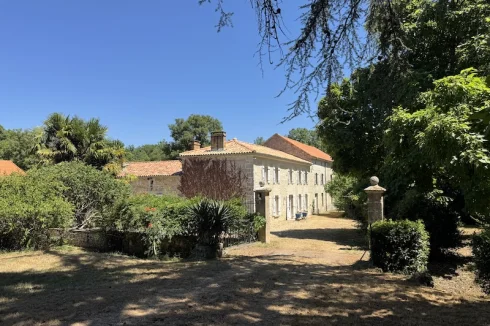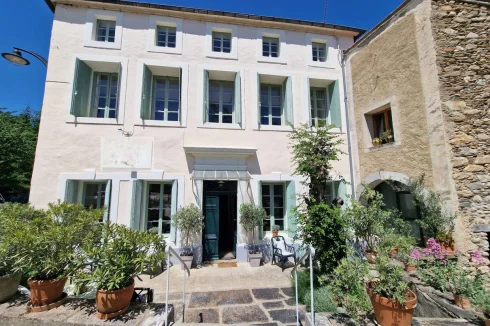Microentrepreneur Landlord of Gite Rental
Tuesday 10 November 2020
What are the rules that apply to register as a micro-entrepreneur landlord of furnished accommodation?
The legal and fiscal status of those who let out furnished accommodation in France has always been subject to a great deal of controversy, as in law it is considered a 'civil' activity but for tax purposes it is treated as a commercial activity.
The picture is made more confusing because the term location meublé (furnished letting) itself refers to many different types of accommodation, to which different rules apply.
Such accommodation may be either short-term lettings for holidays, overnight stays for visitors, or serviced holiday residences; others are let on a long-term basis to a tenant as their principal home. The accommodation may also be self-contained or shared.
Landlords who let such properties may do so on an entirely private basis, or as a registered business.
Professional and Non-Professional Landlord
For decades, the French government have sought to encourage the development of the furnished holiday rental sector by offering tax incentives to those who invest in such properties.
For that purpose, they have created two different tax regimes – Loueur en Meublé Professionnel (LMP) and Loueur en Meublé Non Professionnel (LMNP).
Being an LMP allows you to set off rental losses against your total income (revenu global), and there is relief on capital gains tax. So it offers generous tax advantages, although social security contributions are always payable, and the benefits of the status are not always evident.
However, to obtain LMP tax status your total rental receipts must be at least €23,000pa, which must be greater than your other income (excluding pension income). The receipts can be from more than one property, home or abroad. In practice, few landlords are able to meet both the criteria.
Under the social security code, only those landlords who do meet the criteria become liable for the payment of social security contributions, when it is then necessary to adopt an appropriate business structure to run the activity.
They may do so as a micro-entrepreneur, but as there are turnover limits to this status and the tax and social security regime is not advantageous for if you are making a major investment, it is rarely the best approach. Most large landlords run the business through a limited company using the tax status of régime réel.
If the activity generates receipts of under €23,000, the income is regarded as investment income (revenu de patrimoine) and not business income (revenu d'activité).
Nevertheless, many landlords of holiday gites run the activity as a registered business, more often than not as a micro-entrepreneur and we have recently received a number of mails from readers concerned that as they are not a ‘professional’ landlord they had no entitlement to this status.
Paul Duvaux, an avocat fiscaliste, specialising in this sector considers that in strict legal terms that is likely be the case, but whether there is any reason to be concerned about it is another matter, stating: “the issue is a complicated one which even the authorities themselves frequently fail to understand.”
He considers not only is there a lack of understanding by officials, but that officials also turn a blind eye to irregular registrations as the public purse is a net beneficiary of sloppy practice: "Many landlords of meublés de tourisme become business registered and unnecessarily pay social security contributions, but the authorities are not going to be unhappy about people paying too much in social security contributions."
As a micro-entrerpreneur, the standard social security contribution rate is 22% of turnover (but 6% for a meublés de tourisme classés), whereas an unregistered landlord pays 17.2% social charges on net income.
In a sector where the scope for undeclared income is large, when owners do pay their taxes and social security contributions it is not difficult to see why the legal nuances are less of a priority for the regulatory agencies.
We are aware of occasional problems that arise at the time of business registration, more often because the activity has not been correctly described by the applicant. On other occasions it is because the local registration centre is switched on and refuses the application.
Once registered, neither is little evidence of action being taken by the authorities (URSSAF, Tribunal de Commerce, Chambre de Commerce) to disaffiliate landlords from the business register if their turnover is under €23,000.
The business must of course be 'real' and not 'incidental', but that is a
condition for all business registrations, whatever the type of activity. That does not mean that the activity cannot be seasonal, as most businesses have peaks and troughs.
Julien Monge of tax advisors SVP considers that the law itself is also ambiguous, as there is a lack of consistency between the social security code and tax doctrine.
Under the tax doctrine micro-entreprise status is available to both professional and non-professional landlords, stating: "Le régime des micro-entreprises….... s'applique au loueur en meublé...... à la condition que son chiffre d'affaires annuel, n'excède pas un certain seuil. Ce seuil dépend du type de location réalisée et non de son caractère professionnel ou non professionnel."
Whilst it is possible to use micro-entreprise tax status without being business registered, the doctrine also states that the system of 'micro-fiscal' (pay-as-you go income tax) can also be used, which is only available to those who are business registered as micro-entrepreneurs.
Neither should it be overlooked why the distinction between LMP/LMNP arose, which was in large measure to ensure major landlords were liable for social security contributions on their rental income.
So, if you become business registered as an LMNP you do face the double disadvantage of paying social security contributions but not having any of the tax breaks that go with LMP status. Those proposing major investment in a rental property would certainly be
well advised to take professional advice. You can also read our guide on the link at the bottom of this page for a great deal more information.
Nevertheless, for most gite owners the tax implications of business registration are rarely the main consideration, as self-employed status grants automatic access to the health system. Given that EEA early retirees are nominally unable to obtain health cover in France, and the cost of private health cover often prohibitive, business registration is a relatively painless solution. As the activity is generally small, the tax penalty is not great.
There is also the prospect of change in the wind, for with the arrival of AirBnb and similar portals on the scene, the damage
to the hotel sector has been significant, and there are demands for
equal treatment between the sectors.
Many commentators consider that the distinction between LMP and LMNP is arcane and one that is likely to be abolished, with all furnished lettings activity done on an habitual basis considered a commercial activity and thereby subject to social security contributions. Indeed, in creating the status of LMP the government have already began that change, as an LMP is considered to be a commercial activity.
Guilluame Fonteneau, a financial advisor in the sector states that: "the situation is incredibly complex. It seems unlikely that things will remain as they are. Some clarification is inevitable. Will it take the form of an obligation to register, for furnished rental landlords, or the abolition, pure and simple of the tax regime for furnished rentals in favour of taxation according to business profits. Only the future will tell us"
For those who remain concerned about whether they may be entitled to the self-employed status, or who are unable to get registered, there is action you can take.
Parahôtelerie
Alongside the tax regime of location meublée there exists tax status called 'parahôtelerie'.
This is a status that is reserved to those who offer accommodation with a range of services (prestations), similar to those that may be offered in a hotel, hence the derivation.
It is used by those who let short-term holiday accommodation, such as a camping site, holiday residences, chambre d'hote, but also a gite.
Gite properties are known as meublés de tourisme, and where they are classed they have the suffix ‘classés’ added to them. The term ‘gite’ no longer has a legal meaning in French law.
They are defined in French law as: 'des villas, appartements, ou studios meublés, à l’usage exclusif du locataire, offerts en location à une clientèle de passage qui y effectue un séjour caractérisé par une location à la journée, à la semaine ou au mois, et qui n’y élit pas domicile. La location doit être conclue pour une durée maximale et non renouvelable de 90 jours consécutifs à la même personne.'
Paul Duvaux considers that "meublés de tourisme may or may not provides services. Although not common practice, where the owner of a meublé de tourisme provides regular services to their guests then it is possible for them to obtain the status of 'meublé de tourisme para-hôtelier'."
Those services include cleaning of the property, meeting the guests and provision of an exchange of linen.
In effect, the activity is then considered not to be civil in nature, as is the case with location meublé, but a commercial activity. Indeed, as if to emphasise the change, in areas of housing stress there is a legal obligation on landlords of meublé de tourisme to obtain a planning change of use of the premises to 'hébergement hôtelier'.
'Le régime fiscal de la location meublée est réservé aux locaux comportant tous les éléments mobiliers indispensables à une occupation normale par le locataire.
Cependant sont considérées comme des prestations de nature hôtelière ou para-hôtelière, non soumises au régime fiscal de la location meublée, les conventions d’hébergement qui, en raison des services fournis ou proposés, dépassent la simple jouissance du bien.
Ainsi, l’exploitant qui fournit ou propose, en sus de l’hébergement, au moins trois des prestations mentionnées au b du 4° de l’article 261 D, à savoir le petit déjeuner, le nettoyage régulier des locaux, la fourniture de linge de maison ou la réception, même non personnalisée, de la clientèle, dans des conditions similaires à celles proposées par les établissements d’hébergement à caractère hôtelier exploités de manière professionnelle, relève du régime de la para-hôtellerie, non du régime fiscal de la location meublée.
En revanche lorsque ces services sont fournis ou proposés de manière accessoire et dans des conditions non similaires aux établissements d’hébergement à caractère hôtelier, l’activité relève du régime fiscal de la location meublée.'
To be considered para-hôtelerie it would be necessary, for instance, cleaning of the property during a letting, not merely between lettings. It would also mean the provision of a change of linen during the letting, not merely at the end of it.
Nevertheless, the doctrine states that the landlord only has to 'propose' (offer) such services for them to be able to obtain this status and to have the means available to deliver them! The services may be provided through a third party, not necessarily directly by the owner.
This was set out in a landmark case over the issue dating from 2016, when the judges stated:
"les critères définis par la loi n'exigent pas que ces prestations parahôtelières soient matériellement effectuées mais seulement que la société dispose des moyens nécessaires pour répondre aux éventuelles demandes de ses clients".
Concernant le nettoyage des locaux qui doit être effectué de manière régulière : "cette condition sera considérée comme établie lorsque, bien que ne fournissant pas effectivement un service régulier de nettoyage, l'exploitant dispose des moyens lui permettant de proposer un tel service au client durant son séjour, selon une périodicité régulière. En revanche, elle devra être considérée comme non satisfaite si l'exploitant se contente d'un nettoyage au début et en fin de séjour. / c - l'exploitant dispose des moyens nécessaires pour être en mesure de fournir pendant le séjour le linge de maison à l'ensemble des locataires. / d - l'exploitant dispose durant la période de location des moyens nécessaires pour être en mesure de proposer un service de réception même non personnalisé de la clientèle. Cet accueil peut être confié à un mandataire qui l'assure en un lieu unique différent du local loué lui-même."
Clearly, if you run a meublé de tourisme and you do not offer at least three services, and you are concerned about being disaffiliated, you need to review your letting terms, when it would also be prudent that the offer was explicitly stated in the tenancy agreement.
Small landlords also operate under the turnover threshold that would require they charge (or recover) vat for those services, but most jurisprudence about the tax status of meublé de tourisme has concerned those who have sought to recover vat, when it has been refused by the tax authority. Be warned!
Note: Microentrepreneur business registration needs to be distinguished from simple 'micro-entreprise' tax status, which is the default tax regime given to small landlords even if not business registered. All landlords of self-contained furnished accommodation are also given a business registration number (Siret) by the tax office, but this does not imply micro-entrepreneur business registration and payment of business social security contributions, merely liability to the social charges.
Thank you for showing an interest in our News section.
Our News section is no longer being published although our catalogue of articles remains in place.
If you found our News useful, please have a look at France Insider, our subscription based News service with in-depth analysis, or our authoritative Guides to France.
If you require advice and assistance with the purchase of French property and moving to France, then take a look at the France Insider Property Clinic.





